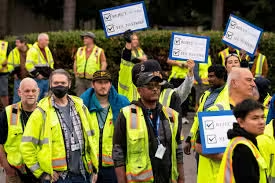Boeing’s production lines have come to a halt after factory workers in the Seattle area and Oregon walked off the job following the overwhelming rejection of a new labor contract. The strike, which began just after midnight on Friday, is a significant setback for Boeing, which has already been grappling with production challenges and efforts to restore its reputation after safety concerns with its planes in recent years.
In a decisive vote, 94.6% of the workers turned down the tentative agreement proposed by Boeing and the International Association of Machinists and Aerospace Workers (IAM), and 96% of them voted in favor of a strike—far surpassing the two-thirds majority needed to authorize a walkout.
“We strike at midnight,” IAM District 751 President Jon Holden declared at a news conference, referring to the stoppage as an “unfair labor practice strike.” Holden accused Boeing of engaging in discriminatory actions, coercive questioning, unlawful surveillance, and making illegal promises of benefits to employees. He also emphasized that Boeing needs to return to the table and bargain in good faith. Boeing did not directly respond to these allegations.
Boeing issued a statement acknowledging the vote and saying, “The message was clear that the tentative agreement we reached with IAM leadership was not acceptable to the members.” The company reiterated its commitment to improving relationships with employees and expressed readiness to resume negotiations.
Stephanie Pope, CEO of Boeing’s commercial airplane division, had called the contract proposal “the best contract we’ve ever presented,” noting that in previous negotiations, Boeing typically held back some benefits to secure approval on a second vote. This time, she said, the company had taken a different approach, offering upfront what it believed was a strong deal.
The rejected proposal included a 25% wage increase over four years along with improvements in health care and retirement benefits. However, union members felt that the proposed raises fell short of the roughly 40% increase they had demanded, particularly given rising living costs. Many workers expressed dissatisfaction with the deal’s failure to address inflation and the high cost of living in the region.
The strike marks a major challenge for new Boeing CEO Kelly Ortberg, who has only been in his role for five weeks. Ortberg had urged workers not to strike, warning that a work stoppage could jeopardize the company’s recovery and future prospects. Despite his pleas, the workers chose to proceed with the strike, signaling deep discontent with Boeing’s current offer.
The strike is likely to exacerbate Boeing’s existing production difficulties and could have wider implications for its efforts to meet demand for its bestselling airplanes.
Read More: Who Are the Key Cast Members in “The Wanker” (2025) and What Roles Do They Play?
